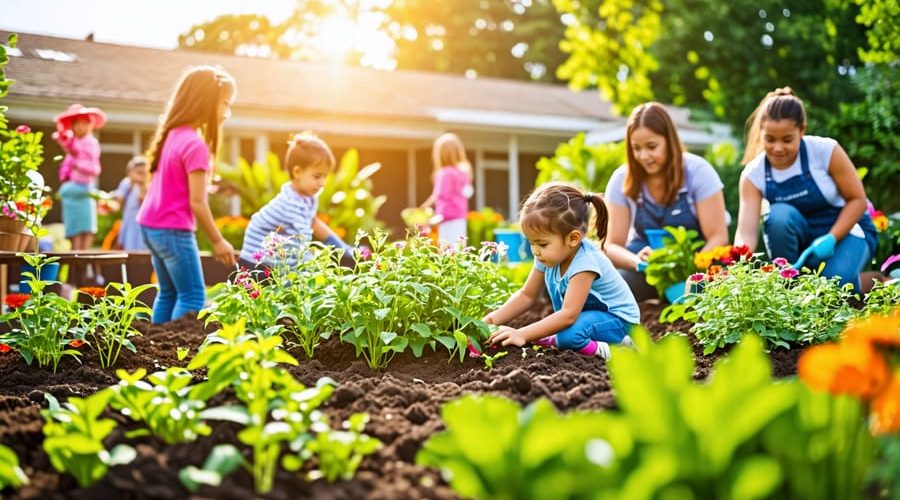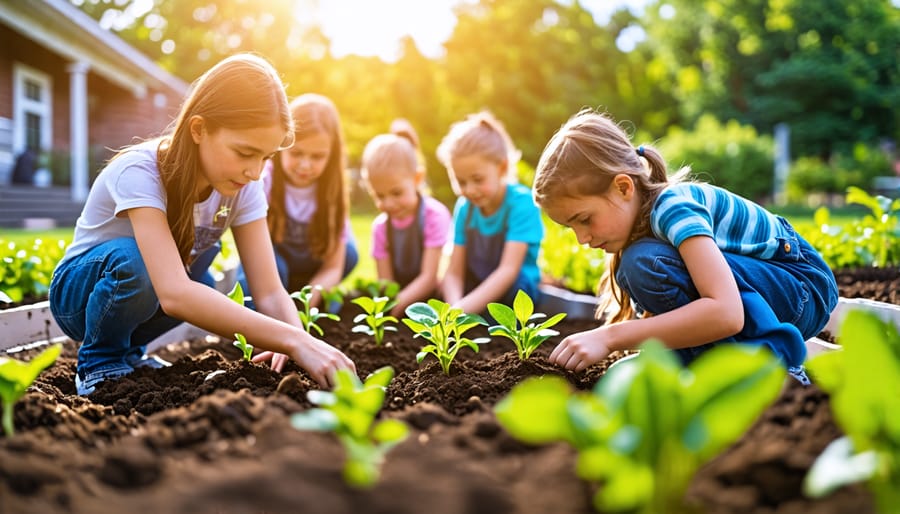
Cultivating Minds: 7 Powerful Benefits of School Gardens
Gardens in schools cultivate more than just plants – they grow young minds and communities. From enhancing academic performance to fostering environmental stewardship, the benefits of school gardens are far-reaching and profound. By integrating gardening into the curriculum, students gain hands-on learning experiences that bring science, math, and nutrition to life. Beyond academics, tending to plants nurtures important life skills like responsibility, teamwork, and perseverance. School gardens also promote physical and mental well-being, providing fresh produce and a calming escape from the classroom. Environmentally, these green spaces teach sustainable practices and respect for nature. Perhaps most importantly, gardens build a sense of community as students, teachers, and families come together to plant, tend, and harvest. In an era of screens and concrete, school gardens offer a vital connection to the earth and each other – one seed at a time.
Enhancing Academic Learning
School gardens provide abundant opportunities to enhance academic learning across multiple subjects. Science lessons can come alive as students observe plant life cycles, study soil composition, and conduct experiments in the garden. Measuring plant growth, calculating area and perimeter of garden beds, and analyzing harvest yields offer hands-on applications of mathematical concepts. Language arts skills blossom when students write garden journals, poetry inspired by nature, or instructions for caring for plants.
History and social studies connect to gardening as well, from ancient agricultural practices to current issues of sustainability and food security. Art projects using natural materials or depicting garden landscapes encourage creativity. Even physical education can incorporate garden tasks for building strength and coordination.
Garden-based lesson plans are limited only by the imagination. Younger students might dissect seeds, measure rainfall, or create garden signs. Older students could design experiments to improve yield, calculate crop profitability, or explore garden-themed literature. By integrating the garden into existing curriculum, teachers cultivate engaged learners excited to dig into knowledge. School gardens grow minds as well as plants, nurturing a lifelong love of learning in any subject.

Teaching Life Skills & Responsibility
Gardens in schools provide an excellent opportunity for students to develop essential life skills and a sense of responsibility. Tending to plants teaches patience, as students learn that growth takes time and consistent care. They discover the importance of proper watering, weeding, and nurturing their plants to ensure healthy development. Gardening also fosters a sense of responsibility, as students take ownership of their plants and understand the consequences of neglect. Working together in the garden encourages teamwork and collaboration, as students share tasks, tools, and knowledge. When faced with challenges such as pests or weather issues, students develop problem-solving skills by researching and implementing solutions. The hands-on nature of gardening engages students in active learning, making the acquisition of these life skills more meaningful and memorable. By participating in school gardens, students cultivate not only plants but also valuable character traits and practical skills that will serve them well beyond the classroom.

Promoting Healthy Eating Habits
School gardens offer a fantastic opportunity to promote healthy eating habits in children. By involving students in the process of growing their own fruits and vegetables, they develop a deeper appreciation for fresh, nutritious food. Planting, tending to, and harvesting crops from the school garden encourages kids to make healthier food choices. They are more likely to try new fruits and vegetables they have grown themselves, expanding their palate and fostering a love for healthy eating.
Research supports the positive impact of school gardens on children’s dietary habits. Studies have shown that students who participate in gardening programs consume more fruits and vegetables compared to those who do not. This increased consumption of fresh produce can lead to improved overall health and a reduced risk of obesity and related health issues. By instilling these healthy eating habits at a young age, school gardens set children on a path towards lifelong wellness. Moreover, the hands-on experience of gardening teaches kids about the importance of nutrition, where their food comes from, and the value of making informed choices about what they eat.
Improving Mental Health & Well-Being
Gardening in schools provides numerous mental health benefits for students of all ages. Engaging in gardening activities can be a powerful stress reliever, allowing students to take a break from the pressures of academics and social interactions. Tending to plants, digging in the soil, and watching seeds grow into thriving plants can be incredibly calming and meditative. This hands-on connection with nature helps students unplug from technology and find a sense of inner peace.
Moreover, gardening has been shown to improve mood and increase feelings of happiness and well-being. The act of nurturing plants and witnessing their growth can boost self-esteem and provide a sense of accomplishment. Students who struggle with behavioral issues or have difficulty focusing in traditional classroom settings often thrive in the garden environment. The physical activity, fresh air, and opportunity for sensory exploration can help regulate emotions and improve overall behavior.
Gardening also promotes mindfulness and increases focus. By engaging multiple senses and requiring attention to detail, gardening helps students stay present in the moment. This heightened awareness and concentration can translate to improved performance in the classroom. Additionally, the repetitive tasks involved in gardening, such as watering, weeding, and harvesting, can be therapeutic and help reduce anxiety and depression symptoms.
Incorporating gardening into the school curriculum provides a holistic approach to education, nurturing not only academic growth but also emotional and mental well-being. By creating a green oasis on school grounds, students have a safe and nurturing space to unwind, connect with nature, and cultivate a positive outlook on life.
Fostering Environmental Stewardship
School gardens provide a hands-on opportunity for students to learn about sustainability, ecology, and conservation. By actively participating in planting, tending, and harvesting crops, children gain a deeper understanding of the natural world and the importance of preserving it. They witness firsthand the lifecycle of plants, the role of pollinators, and the impact of weather and seasons on growth. Through these experiences, students develop an appreciation for the delicate balance of ecosystems and the need to protect them. School gardens also teach eco-friendly practices like composting, water conservation, and organic gardening methods. By learning these sustainable techniques at a young age, children are more likely to adopt environmentally responsible habits that last a lifetime. Additionally, school gardens can incorporate native plants and wildlife-friendly features, further emphasizing the importance of biodiversity and habitat preservation. By fostering a connection to nature and instilling a sense of environmental stewardship, school gardens inspire the next generation to become advocates for a greener, more sustainable future.
Strengthening School & Community Connections
School gardens provide a unique opportunity to strengthen connections between the school and the broader community. By involving parents, volunteers, and local partners in the planning, planting, and maintenance of the garden, schools can foster a sense of shared purpose and collaboration. This involvement not only lightens the workload for school staff but also allows community members to contribute their knowledge, skills, and resources to support student learning and growth. Through regular garden workdays, special events, and ongoing communication, school gardens become a hub for building relationships and a sense of belonging. As students work alongside adult mentors and volunteers, they develop important social skills and an appreciation for the value of community engagement. Local partners, such as garden centers, farms, and environmental organizations, can provide valuable expertise, materials, and opportunities for hands-on learning experiences. By strengthening these school and community connections, school gardens cultivate a vibrant, supportive environment that extends beyond the classroom walls, benefiting students, families, and the wider community.

Conclusion
School gardens offer a multitude of benefits that positively impact students’ academic performance, personal development, health, environmental awareness, and social connections. By providing hands-on learning experiences, fostering a love for nature, encouraging healthy eating habits, and promoting environmental stewardship, school gardens create a well-rounded educational environment. Moreover, they serve as a platform for community engagement and social skill development, preparing students to become responsible and empathetic citizens.
Given the numerous advantages, it is clear that more schools should embrace the concept of gardening. By integrating gardens into their curricula and campus grounds, schools can create a nurturing and inspiring atmosphere that supports the holistic growth of their students. Imagine a future where every school has a thriving garden, where children eagerly learn, grow, and connect with nature and each other. The positive impact of school gardens extends far beyond the classroom, shaping a generation of environmentally conscious, healthy, and compassionate individuals who will lead us towards a greener and more sustainable world.
